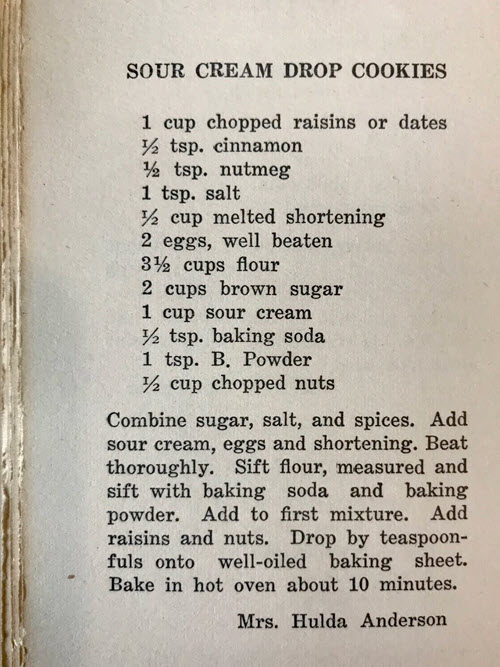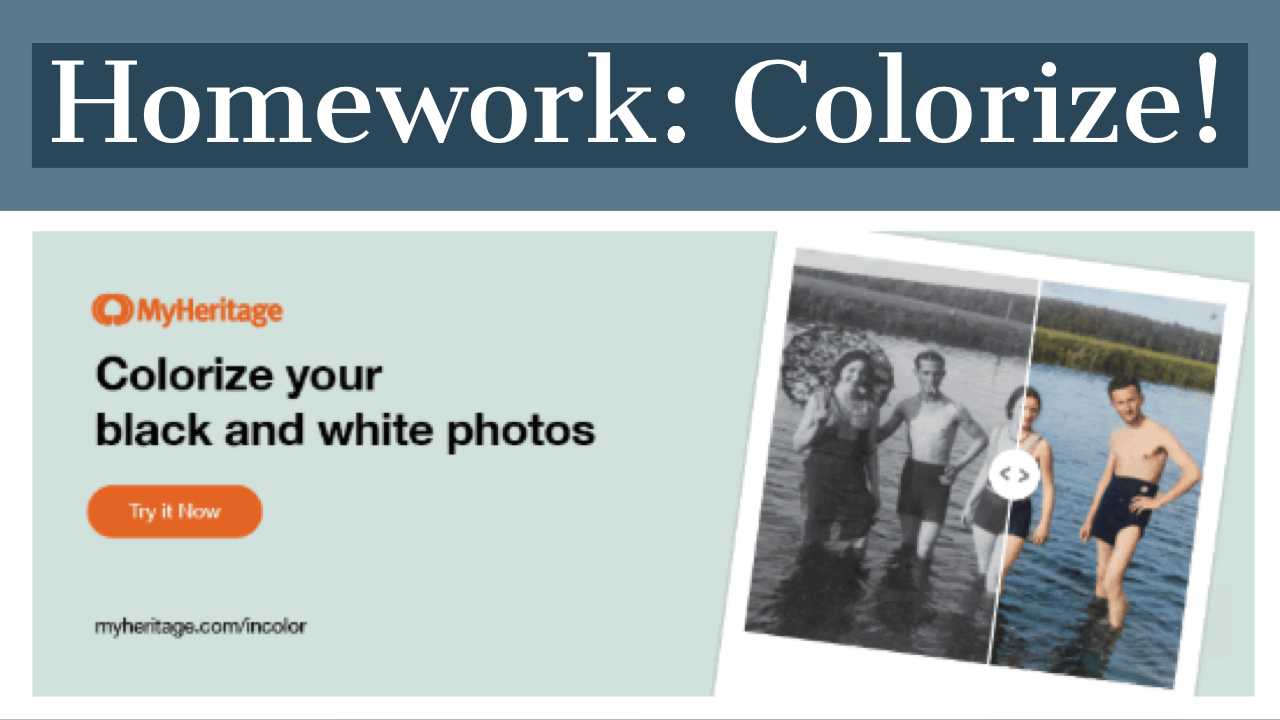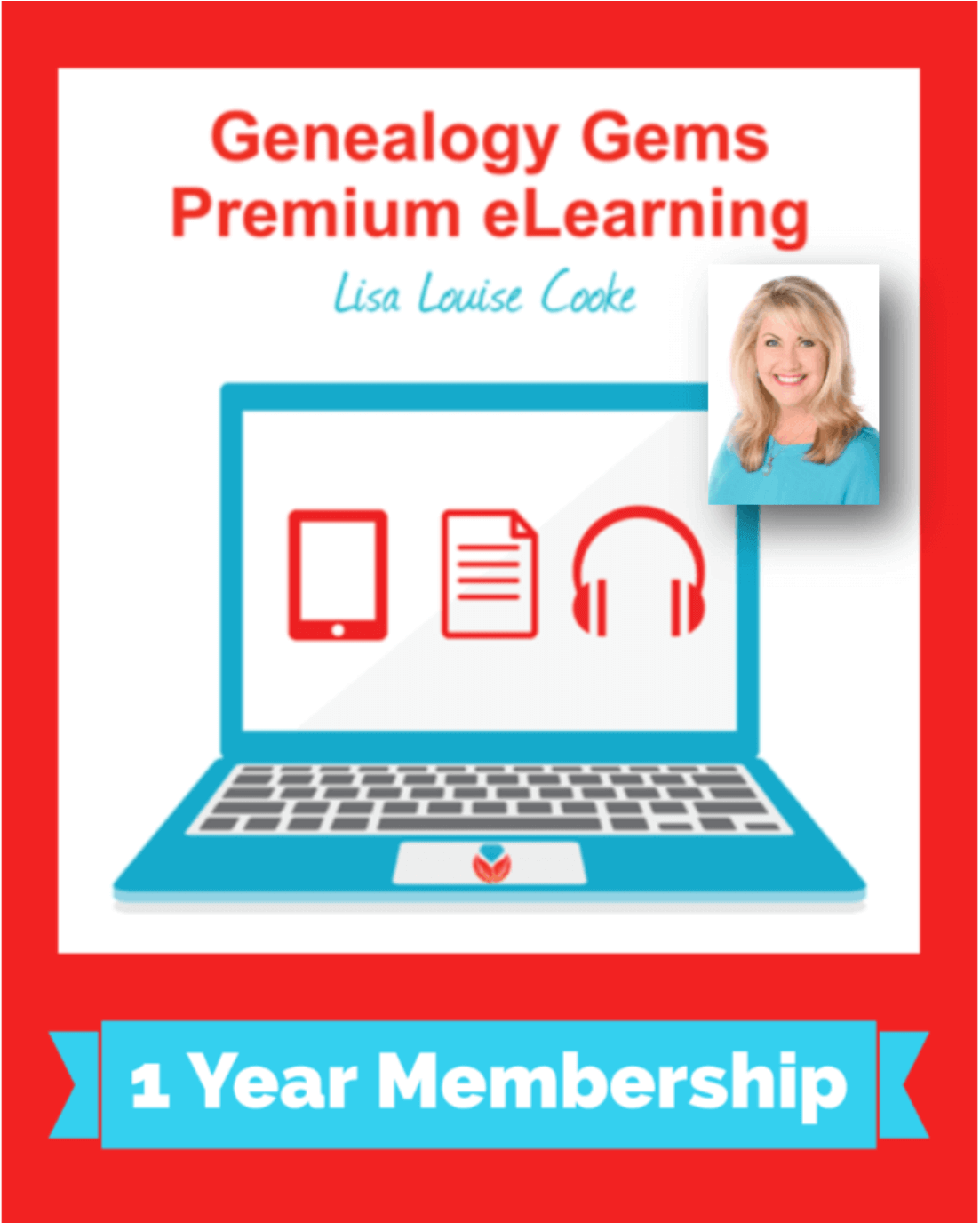Live show air date: April 2, 2020
Episode 2 Video and Show Notes
What’s even better than listening to a genealogy podcast? Watching and listening to a genealogy online show! Elevenses with Lisa is the new online video series by author and international genealogy speaker and host of The Genealogy Gems Podcast, Lisa Louise Cooke. Tune in live or watch on your own schedule. Click to watch below, and scroll down for all the details from Episode 2:
In Elevenses with Lisa I get a chance to talk about many of my favorite things including genealogy. Below you’ll find items you may want to try yourself, as well as the notes from our genealogy learn-at-home session.
The Live Show is Moving to the Genealogy Gems YouTube Channel
Join me for the live show Elevenses with Lisa at the Genealogy Gems YouTube channel starting April 16, 2020. (Episodes 1-3 were held on Facebook Live.)
- Go to the Genealogy Gems YouTube channel here.
- Once there click the Subscribe button.
- Then click the bell icon to receive notifications. (This is important because it will alert you by email that a new show has been scheduled or published.)

After “Subscribing” click the bell icon.
- Look for the next scheduled live episode at the top of the list of videos and click “Set Reminder”
Click here to learn more about how to tune in the live show.
The Cookie Recipe
Many of you asked for the yummy cookie recipe I mention in this episode. Isn’t it incredible that a woman in California who was attending my genealogy presentation had a sister with a cookbook from the little town in Minnesota of my mother-in-laws ancestors from 80 years ago that contained the exact family recipe I was in search of? Talk about genealogical serendipity!
Here’s the recipe (I set my oven to 375 degrees):

Sour Cream Drop Cookie Recipe from the 1940s.
TV Viewing Recommendation
I also shared with you that my favorite television series is Good Neighbors (The Good Life in the UK). It stars the amazing ensemble cast of Richard Briers, Felicity Kendall, Penelope Keith and Paul Eddington. Sometimes you can catch the series on Amazon Prime, or PBS, but the DVDs are well worth having. (If you decide to order them, we appreciate you using our affiliate link below. We are compensated when you make a purchase, at no cost to you. Thank you for supporting this free Elevenses with Lisa show.)
Colorize Your Family Photos
We got some happy news during this time of self-quarantine. MyHeritage is granting free access to MyHeritage In Color™ through April 23, 2020. Click the image below to read my article about colorizing your old family photos at MyHeritage.
How Alice the Genealogist Avoids the Rabbit Hole Part 1
Don’t let unexpected genealogical finds send you down a rabbit hole any longer. We’ll cover concrete strategies for staying focused on what matters most, while not losing track of opportunities that present themselves. You’ll also learn about free tech tools that you can put in place to give you peace of mind, take back those lost hours, and help you be more productive.

Follow along with me to learn how Alice the Genealogist avoids falling down the online rabbit hole!
Vulnerability to Rabbit Holes
In order to improve in anything, you have to know your vulnerabilities. When it comes to falling down a genealogical rabbit hole I’ve identified 5 of the most common vulnerabilities:
- Not having a crystal-clear research question
- Not having your next steps mapped out
- Not having a specific method for dealing with BSOs (bright shiny objects)
- Not implementing that method consistently
- No muscle to stick with your plan
We’re going to tackle 1, 2, and 3 above. With these in place I believe you’ll feel confident and take care of 4 & 5!
1. Write a Research Question
Before beginning your research, take a moment to write out your research question or statement. It will help guide you and keep you on task.
Think about what you want to specifically accomplish. State your goal in specific terms:
“Identify the village in Germany where Louise Nikolowski and her family were from so I can locate church records.”
Effective Research Questions
(according to the Board of Certification of Genealogists)
Genealogy Standards #10:
“Questions underlying research plans concern aspects of identity, relationship, events, and situations. The questions are sufficiently broad to be answerable with evidence from relevant places and times. They are sufficiently focused to yield answers that may be tested and shown to meet or not meet the Genealogical Proof Standard.”
Genealogical-research questions:
- clearly describe a unique person, group, or event as the focus of the question
- clearly state what kind of information that you’re hoping to discover, such as an identity, relationship, event, or biographical detail.
Keep this research question in front of you by:
- printing it out and setting it in front of your monitor
- putting it on a “sticky” note on your computer’s desktop (virtually or physically!)
- writing it at the top of your physical or virtual notebook.
2. Map Your Next Moves
Break your primary research question down into smaller, individual research questions.
According to Elizabeth Shown Mills, after analyzing the existing data:
“we prepare a research plan that defines:
- the resources to be explored
- the strategies to be applied
- the individuals who are to be included in that search
- any special circumstances that will affect the project.”
Example Question:
Where is the birthplace of Gustav Sporowski (father of Alfreda) who resided in Gillespie, Illinois in 1910-1918?
Actionable Steps
Here are examples of questions to be answered that support the research question:
Question 1 – Did he apply for citizenship? If so, what is listed?
Question 2 – Find passenger list: what place of origin is listed?
Question 3 – What was listed for other passengers accompanying him? (If any)
Question 4 – Where are other Sporowskis from that are listed in passenger lists?
For each question above, make a list of the resources (records) you need to find to answer these questions, and where you plan to look for them. Track the outcome.
“we prepare a research plan that defines:
- the resources to be explored
- the strategies to be applied
- the individuals who are to be included in that search
- any special circumstances that will affect the project.”
Coming next in the next episode:
#3 Dealing with BSOs – We’ll discuss an incredibly easy and effective method for handling Bright Shiny Objects that distract you from your research plan!
Learn all year long at home with me
Click here to learn more about Genealogy Gems Premium Membership, which includes:
- 50+ of my genealogy video classes and handouts
- 180+ Exclusive Premium Podcast episodes







